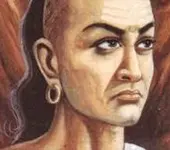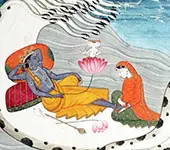Comments
Read more comments
Knowledge Bank
Who is Maya Sita?
According to Devi Bhagavata, during vanavasa Agni Bhagavan came to Lord Rama and told him that time has come for him to eliminate Ravana. As a provocation for this, Ravana will abduct Sita Devi. To make sure that she doesn't become impure because of Ravana touching her, Agni would create a replica of Sita Devi and keep the original Devi with him. This replica is Maya Sita. Ravana will be able to abduct only Maya Sita. After destroying Ravana when they return to Ayodhya, Sita will be compelled to enter into the fire to prove her purity. At that time, Agni Bhagavan will take back Maya Sita and the original Devi will come out. Lord Rama agreed.
Transcript
(Click here to read more)
We saw about the brilliant Ayodhya at the time of Lord Rama's birth. Quite suitable for the Lord to take birth in. What kind of a king was Raja Dasharatha? How was he eligible to become the father of the purushottama himself? Let's see. Dasharatha was a vedavit. There are two kinds of knowledge pertaining to Vedas. One, to know how to chant. Two, to know the meaning of Vedas. Those who chant, they can manifest desired goals using the power of mantras. ....
Transcript
(Click here)
We saw about the brilliant Ayodhya at the time of Lord Rama's birth.
Quite suitable for the Lord to take birth in.
What kind of a king was Raja Dasharatha?
How was he eligible to become the father of the purushottama himself?
Let's see.
Dasharatha was a vedavit.
There are two kinds of knowledge pertaining to Vedas.
One, to know how to chant.
Two, to know the meaning of Vedas.
Those who chant, they can manifest desired goals using the power of mantras.
Those who know the meaning, they put it to use as the guiding light for dharmik living.
Dasharatha knew the meaning of Vedas.
He had a big team of brave warriors and wise people with him to help him in the administration of the kingdom.
Best of horses, elephants, chariots, weapons.
He had all of them.
Meaning king along with wise people took decisions.
Not based on public opinion or media or social media pressure, as it happens many a times nowadays.
Decisions were taken by wise people.
Dasharatha was a visionary, never thought short term, always thought long term.
He was brilliant, famous, his glory spread all around as an able king.
People of Ayodhya and even interior parts, interior villages of his kingdom, they all loved him.
He was very popular.
When we talk about Dasharatha , the prejudice is how he foolishly gave a boon to Kaikeyi which ended up in the Lord's exile.
No, it was not like that.
Dasharatha was an able and glorious king.
He was an atirathee.
Rathee, maharathee and atirathee.
Rathee is someone who can fight 9,999 people single-handedly.
Maharathee is someone who can fight 10,000 or more people single-handedly.
Someone who can fight 10,000 maharathees single-handedly or rather any number of people is an atirathee.
Dasharatha was an atirathee.
He performed many many yajnas.
He did a lot of things for the welfare of the people, like digging of wells, ponds.
This he did not as an administrative responsibility.
This he did as charity, as dharma.
As personal charity also.
He had everyone under his command.
He was equal to a Maharshi, a Mahan Rishi.
He was famous not only on earth, in the Lokas of Gandharvas, Yakshas, Kinnaras.
Their world is called Antrikshaloka.
And he was famous also in Swargaloka.
Dasharatha had a very powerful army, the chaturanga sena comprising of horses, chariots, elephants, and foot soldiers.
Thus far, he had defeated all his enemies.
And he had a lot of powerful friends as well.
He had full control over his senses.
He knew where to focus them and what all to keep them away from.
In terms of wealth, he was like Indra and Kubera.
As protector of his people, as good as Manu, the first ever king of the world, the faultless king.
Raja Dashartha was honest to the core.
He made his subjects also live a virtuous life.
Following truthful occupations.
And pursuing achievement, not in conflict with dharma.
Meaning they achieved desires without harming others, without exploiting others, without cheating, without shortchanging.
Dasharatha's people had all that they needed.
They were satisfied.
Most of them were educated, learned and wise.
They helped each other.
They were charitable.
In his kingdom, there were no poor.
All the subjects had sufficient wealth.
Nobody could complain that I don't have money to do good things.
I don't earn enough.
I don't have money to achieve my desires.
This was not there.
The householders could meet their obligations towards the family and the society.
Who is considered as a householder?
A householder or kutumbee has 9 people dependent on him, to take care of, including himself, 10.
माता पिता स्नुषे पुत्रौ पुत्री पत्न्यतिथिस्स्वयं दशसंख्यः कुटुम्बीति विष्णुनोक्तं द्विजोत्तम।
Father, mother, two sons, two daughters in law, one daughter, wife, guest, and he himself.
This is the minimum.
Avoding girl child has never been part of out culture.
A family is considered to be complete only if a girl child is there.
Lust was absent in Ayodhya.
Cruelty was absent in Ayodhya.
There was no one who would torture his wife, children, cause obstacles in dharma karyas, or cause harm to oneself through vices.
There were no one who would cause harm to his siblings or parents out of greed.
There were no illiterates.
There were no atheists.
They were all polite and well behaved.
They were all well disciplined and had good healthy habits.
They were innocent with clean pure hearts.
They all wore valuable ornaments, they wore anointments such as chandana, perfumes such as kasturi.
They had all kinds of comforts.
You won't find anyone in Ayodhya who has not had his full meal at the right time, nor anyone not willing to share food.
They all knew how to control their minds.
There were no thieves, outcasts.
They followed varna dharma.
They were fully committed to their own prescribed religious duties.
Brahmins learned and memorized Vedas on an ongoing basis.
They accepted less and gave more.
They were all learned.
They did not have jealousy among themselves.
They learned Vedas with their six angas.
And were liberal in helping others.
Nobody was mentally weak or suffered anxiety or fears.
They were all healthy.
Men were handsome.
Women were beautiful.
They were all dedicated to the king.
They all worshiped Gods every day.
They had gratitude towards those who helped them.
They all lived up to purnayu.
All of Dasharatha's soldiers were valorous like lions.
They were all well-trained fighters and as fierce as flames of fire.
Ayodhya's horses were of great breeds- Kamboja, Bahleeka, Vanayuja, from the banks of Sindhu Nadi.
All as big and powerful as the horses of Indradeva himself.
The elephants were as huge as mountains.
From the Vindhyas, from Himalayas.
Belonging to the clan of Airavata, Mahapadma, Anjana, and Vamana.
These are all diggajas.
There were also elephants of crossbreeds.
There were breeds called Bhadra, Mandra, Mriga.
They were crossbred.
Like Bhadra-Mandra, Mandra-Mriga, Bhadra-Mriga.
This was Ayodhya under Dasharatha.
Absolutely befitting the name Ayodhya; योद्धुं अशक्या- that which can not be conquered.
Recommended for you
Discover the Greatness of Jagannath's Mahaprasad

An incredible spiritual experience - that's what Jagannath's Mahaprasad offers! The divine taste and blessing of this offering are simply unmatched.....
Click here to know more..Shastras tell you the method to follow in every decision making

Vamana Stuti

kim te'bheesht'am dadaami tripadaparimitaa bhoomiralpam kimetat trailokyam bhaavagarbham balimidamavadadvaamano vah' sa paayaat.....
Click here to know more..